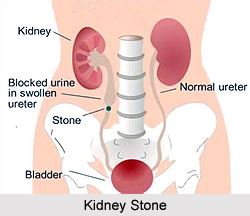 The health disorders affecting the normal functioning of kidneys are known as kidney disorders. There are several factors that are identified as probable causes of kidney disorders. The causes are related to a person`s improper dietary habits and lifestyle and sometimes, other health disorders may also cause kidney diseases. The causes usually vary according to the different types of diseases. Knowing the exact cause of a particular type of kidney disease helps a lot in choosing the right treatment method. Most types of kidney diseases attack the nephrons and cause them to lose their filtering capacity, over a long period of time. However, the damage to the nephrons can be done within a short period as well.
The health disorders affecting the normal functioning of kidneys are known as kidney disorders. There are several factors that are identified as probable causes of kidney disorders. The causes are related to a person`s improper dietary habits and lifestyle and sometimes, other health disorders may also cause kidney diseases. The causes usually vary according to the different types of diseases. Knowing the exact cause of a particular type of kidney disease helps a lot in choosing the right treatment method. Most types of kidney diseases attack the nephrons and cause them to lose their filtering capacity, over a long period of time. However, the damage to the nephrons can be done within a short period as well.
Diabetes and high blood pressure are considered the two most common causes of kidney disorders. Both the Type 1 and Type 2 Diabetes Mellitus are found to be responsible for kidney disorders. These two types of diabetes lead to a condition named diabetic nephropathy, which is a major cause of kidney disease. Diabetes restricts the body`s normal process of using glucose, a form of sugar. The glucose can act like a poison if it stays in the blood instead of breaking down and this unused glucose in the blood can cause damage to nephrons. The kidney disease caused due to diabetes is known as diabetic kidney disease and this can be prevented by keeping the blood glucose levels down. High blood pressure (hypertension) is another major cause of kidney disorders. Hypertension damages the small blood vessels in the kidneys and makes them unable to filter wastes from the blood. As a result, the waste products and fluid build up to dangerous levels and cause various complications to kidney functioning.
Sometimes, the kidney disorders may be hereditary or congenital. People with a family history of any kind of kidney problem usually have a higher risk of developing kidney disease compared to others. The Polycystic kidney disease (PKD) is an example of hereditary diseases. This is a genetic disorder in which the kidney function is reduced and this condition can eventually lead to kidney failure. Some kidney disorders may occur when a child is still developing in the womb. A rare form of PKD named autosomal recessive PKD is the example of such kidney disease.
A common cause of chronic kidney disease is Glomerulonephritis, also known as nephritis. This is actually the inflammation and damage of the filtration system of the kidneys and it can eventually cause kidney failure. Sometimes, regular use of analgesics (painkillers) over long durations of time can cause analgesic nephropathy, which is another cause of kidney disease. Apart from the analgesics, certain other medications can also damage the kidneys. Ischemic nephropathy is another cause of kidney disorders. This can occur due to clogging and hardening of the arteries (atherosclerosis). An obstruction in the flow of urine by stones, an enlarged prostate, strictures (narrowings) and cancers may also cause kidney diseases. Apart from these, the other causes of kidney disorders include HIV infection, sickle cell disease, heroin abuse, amyloidosis, kidney stones, chronic kidney infections, certain cancers, etc.
Apart from the above mentioned causes, there are also a few other risk factors that can eventually lead to kidney disorders. The health conditions like high cholesterol, heart disease, liver disease, amyloidosis, systemic Lupus erythematosus, vascular diseases like arteritis, vasculitis, or fibromuscular dysplasia, vesicoureteral reflux, problems of the joints or muscles that require regular use of anti-inflammatory medications, etc. are also considered as probable causes of kidney disorders. Sometimes, poisons and trauma like a direct and forceful blow to the kidneys can lead to kidney disease. People having any of these health conditions are at a higher risk of developing kidney disorders in future. However, most of these causes can be avoided by taking various preventive actions.




















